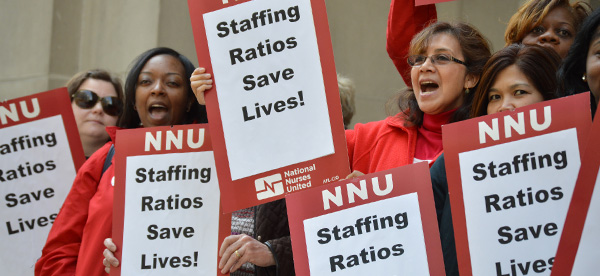Press Release
Registered Nurses Applaud the Introduction of SB324, the Ohio Hospital Patient Protection Act

Bill Sets Safe Staffing Levels and Provides Whistleblower Protections for RNs
National Nurses United, the nation’s largest organization of nurses, applauds the introduction of a bill last week in the Ohio Senate by Senator Michael Skindell – appropriately just prior to Nurses Week – that would set specific limits on the numbers of patients each RN can care for in hospitals throughout the state of Ohio.
SB 324, the Ohio Hospital Patient Protection Act, establishes minimum RN-to-patient ratios for every hospital unit at all times. It also provides whistleblower protection to assure that nurses are free to speak out for enforcement of safe staffing standards.
The bill is modeled on a California law that studies have documented has saved patient lives, improved the quality of care in multiple other ways, and reduced nurse burnout, keeping the most experienced RNs at the patient bedside.
Skindell is joined on his bill, initially by co-sponsors Senators Capri Cafaro, Sandra Williams, and Kenny Yuko.
Currently, there is no limit to the number of patients that nurses care for at any one time in Ohio hospitals.
“These policies will help ensure that patients get the best medical care based on need and will provide nurses with safeguards to ensure that they are protected from retaliation for whistleblowing and refusals to follow potential violations of the law,” said Senator Skindell. “Genuine and enforceable safe-staffing standards will save money and lives by ensuring that patients obtain excellent nursing care.”
“We are thankful that Senator Skindell and the initial co-sponsors of SB 324 recognize the patient safety crisis that exists in our hospitals and stand with nurses to ensure that patient safety and a single standard of high quality care is guaranteed to every patient in our hospitals. Too often hospital administrators place the bottom line over safety,” said Amy Pulley, RN of Affinity Medical Center in Massillon.
“We absolutely need a non-negotiable limit to the number of patients that we care for to protect our patients from injury as well as nurses and other healthcare staff,” said RN Pat Brakefield, who works in a Senior Mental Health unit at Affinity Medical Center in Massillon.
Referencing the high rates of injury to nurses Brakefield noted that “ Sometimes my unit is a dangerous place to be for my patients and for me.”
Decades of studies document link between improved RN staffing and safer care:
A prominent 2010 University of Pennsylvania study comparing California hospitals to New Jersey and Pennsylvania hospitals found that New Jersey hospitals would have 14 percent fewer patient deaths and Pennsylvania 11 percent fewer deaths if they matched California’s ratios in surgical units. The study also found that and fewer California RNs miss changes in patient conditions because of their workload, and nurses have more confidence that patients can manage on their own after discharge.
A September 2012 report by the Agency for Health Care Research and Quality of the U.S. Department of Health and Human Services, titled “State Mandated Nurse Staffing Levels Alleviate Workloads, Leading to Lower Patient Mortality and Higher Nurse Satisfaction,” emphasized the correlation between higher nurse workloads that are associated with more patient deaths, complications, and medical errors.
California hospitals which have had ratios in place since January, 2004 made $4.4 billion in profits alone in the most recent year for which data was available. A vice president of the California Hospital Association, which tried repeatedly to block and reverse the California law, recently admitted hospitals didn't suffer financially "to any significant degree."